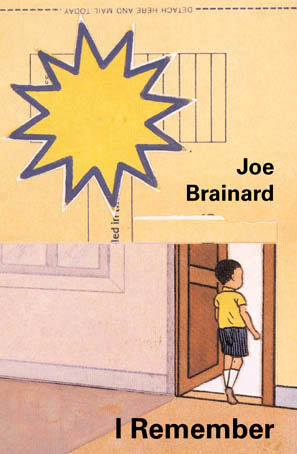 Joe Brainard’s “I Remember†features 167 pages of sentences that all start with “I remember.â€
Joe Brainard’s “I Remember†features 167 pages of sentences that all start with “I remember.â€
There’s nothing remotely eloquent about the language he uses, but by the last page, you’ll wish he remembered more.
Unconventional, unchained and unorganized, this book is a prime example of beauty achieved by simplicity and controlled chaos.
Brainard’s book can easily be classified as an experiment in memoir writing, but when was an easy classification ever worth anything? Sure, there are elements of memoir and autobiography in the book. They are essentially the straw the stirs the drink. However, with a myriad of pop culture mentions and historical allusions, it’s much more.
Simply put, if you want to learn about things in the ‘40s and ‘50s, Brainard’s “I Remember†is a good place to start.
Not many memoirs can discuss the food, film, gossip, politics and art scenes of the time, while accurately putting the main character in the center of it all. In the end, Brainard’s work leaves you with a crystal clear perception of him, a man who’s truly lived life but yearns for the next day, the next memory, the next moment, to prove he can do it all over again.
In small sips, much like a small child with sensitive teeth would drink from a cold-water fountain, Brainard opens up about his family and homosexuality. Sixty years later, it’s easy to see how the world was so much more reclusive and untrusting. From his stories, it’s easy to see how difficult it must have been to express yourself as a gay man. Because of this, his struggle is still an important one that is easy to feel emotionally connected to.
However, the organization of it all will throw off any reader that enjoys a highly- structured tale. There’s no real model for doing what Brainard does properly here, especially since he was the first person to do it. While it may feel like its bouncing around and never setting its feet firmly in any one place, the book eventually builds a foundation built upon honesty and humility. When the time comes to close the book for the last time, it’s nearly impossible to say that you don’t understand what his life has been like.
So while it may be anything but conventional, “I Remember†accomplishes its mission of telling us about Joe Brainard.
Above all these, “I Remember†possesses an ability to get you to think about yourself.
While Brainard is an odd fellow, with sexual escapades [with both sexes] and situations that can induce redness in the cheeks among even the worldliest, his candid nature and ability to hold nothing back are the key to the book’s readability. Too often are memoirs a way for someone to lie to themselves enough to share those fallacies with an audience that doesn’t know any better, twisting situations and moments into ones that make the scribe look like the hero or the sexy villain. After the first few pages of Brainard’s book, with mentions of a cold glass of water after a bowl of ice cream and stuffing a sock in his underwear, it’s obvious that isn’t the case.
The last thing Brainard cares about is what anyone thinks of him. If he did, this book would have never been written.
In 167 pages, Brainard becomes so much more than a man who just remembers. The book is written in a carefree way, like a bar stool conversation with a stranger that develops into a life-long friendship.
Regardless of who you are, you will remember.


Leave a Reply